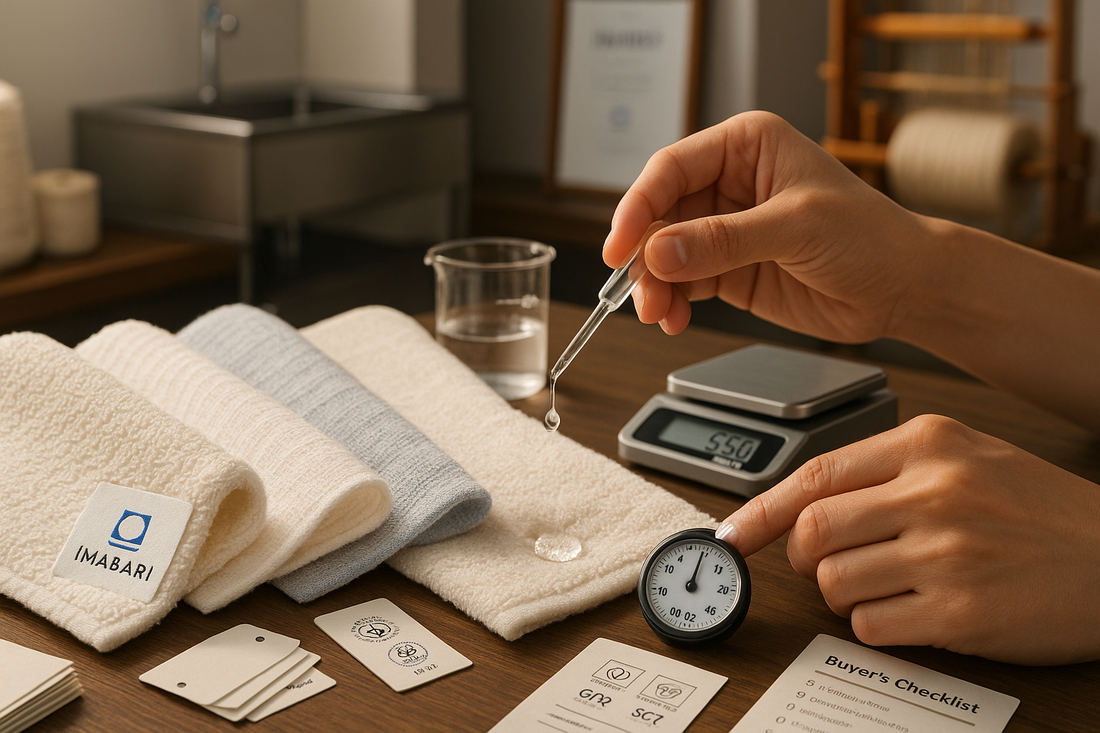
The Best Japanese Towels: A Complete Guide to Imabari Towels
Share
Key Takeaways
-
Imabari certification is the gold standard for absorbency and consistency in Japanese towels.
-
Choose long-staple or extra-long-staple cotton for softness, durability, and strength.
-
Match GSM and weave to your lifestyle: lightweight for travel, midweight for daily use, heavyweight for plush luxury.
-
Pick the right weave: terry for maximum absorbency, gauze for quick-dry, velour for luxury appearance.
-
Don’t trust looks alone: test real-world absorbency whenever possible.
-
Sensitive skin users: prioritize low-chemical cotton and GOTS/OEKO-TEX certified options.
-
Top makers: Imabari-certified value lines, MUJI (value), Uchino & Kontex (midrange), artisanal looms (luxury).
-
Proper care extends lifespan: prewash, avoid softeners, dry correctly, and rotate sets.
-
Balance drying speed vs plushness based on climate and laundry frequency.
-
The “best” towel depends on your routine, skin needs, and budget.
Introduction
When people ask, “What is the best towel made in Japan?” the answer usually points to Imabari towels. Certified to absorb water within seconds, Imabari towels represent the highest standard in Japanese bath textiles.
But choosing the right Japanese towel is about more than prestige. It affects drying speed, softness on sensitive skin, and long-term durability—all critical in homes, hotels, spas, and healthcare settings.
This guide breaks down why Imabari certification matters, how GSM and weave affect performance, and which Japanese towel brands deliver the best value across budgets.
1. Why Imabari Certification Matters
What the Imabari Mark Guarantees
-
Absorbency: must pass standardized water-drop tests.
-
Colorfastness: resistant to bleeding and fading.
-
Manufacturing quality: consistent hygiene, inspection, and traceability.
Real-World Benefits
-
Towels that actually absorb instead of repelling water.
-
Reduced risk of early pilling, fading, or shrinkage.
-
Confidence across price ranges—from value lines to luxury brands.
How to Verify
-
Look for the Imabari logo on sewn tags or packaging.
-
Check official manufacturer lists on the Imabari Towel Industrial Association site.
-
Request close-up photos of tags if shopping online.
2. Materials & Fiber Quality
Long-Staple Cotton (LSC)
-
Stronger, smoother yarns with fewer loose fibers.
-
Longer life and reduced pilling.
Extra-Long-Staple Cotton (ELSC)
-
Varieties like Supima or Sea Island cotton offer superior softness and absorbency.
-
Retain loft and strength through more wash cycles.
Blends & Alternatives
-
Linen blends: quick-drying, great for humid climates or kitchens.
-
Bamboo viscose: soft, eco-marketed, but less durable when pure.
-
Modal/Tencel: eco-efficient, absorbent, often blended for resilience.
For sensitive skin or baby care: choose organic or OEKO-TEX certified cotton with minimal dyes or finishes.
3. GSM, Weave & Construction
GSM (Grams per Square Meter)
-
300–400 GSM: ultralight, fast-dry (travel, gyms, humid areas).
-
400–600 GSM: balanced absorbency & drying (everyday bath towels).
-
600–800+ GSM: plush luxury, slower drying (dry climates, spa settings).
Weave Types
-
Terry (looped pile): maximum absorbency.
-
Gauze/Double Gauze: thin, breathable, quick-drying.
-
Velour (sheared terry): luxurious look, less absorbent.
Construction to Check
-
Combed/ring-spun yarns for fewer loose fibers.
-
Dense loops for higher absorbency.
-
Double-stitched hems to prevent fraying.
4. Match Towels to Your Routine & Climate
-
Everyday bath: 450–600 GSM terry.
-
Luxury bath sheet: 600–800+ GSM terry or velour.
-
Travel/gym: 300–400 GSM gauze or microfiber blend.
-
Kitchen/hand use: 300–550 GSM waffle or gauze weave.
-
Baby towels: 400–600 GSM, long-staple cotton, gentle finish.
In humid climates: lighter GSM or gauze towels avoid mildew.
In dry climates: heavier GSM feels plush and still dries well.
5. Top Japanese Towel Brands
-
Value / Entry-Level: MUJI Organic Cotton Gauze Towels (~$10–$30).
-
Midrange Everyday: Uchino Premium Terry (~$40–$80).
-
Premium Imabari Lines: Certified terry towels (~$60–$150).
-
Luxury / Artisanal: Kontex and small-batch looms (~$100–$250+).
Each serves a different role: MUJI for practicality, Uchino/Kontex for daily comfort, Imabari for luxury assurance.
6. How to Test Absorbency
-
In-store water-drop test: place a drop of water—fast absorption = high quality.
-
Blot test: press a damp hand to check transfer speed.
-
At-home soak test: weigh towel before/after soaking to measure absorption capacity.
7. Care & Maintenance
-
Prewash: opens fibers, improves absorbency.
-
Skip softeners: they coat fibers and reduce water uptake.
-
Wash with mild detergent: warm water, no bleach for colors.
-
Dry: tumble low or line dry; shake to restore loft.
-
Rotate towels: extend lifespan by alternating sets.
8. Quick Buying Checklist
☑ Imabari certification (check sewn label).
☑ Long-staple or extra-long-staple cotton.
☑ GSM matched to climate and use.
☑ Weave suited to purpose (terry/gauze/velour).
☑ Certifications (OEKO-TEX/GOTS for sensitive skin).
☑ Real absorbency data or reviews.
☑ Return policy & warranty if buying online.
FAQ
What makes Imabari towels special?
Strict absorbency and durability tests ensure consistent quality.
Are Imabari towels better than Turkish towels?
Turkish = plush, heavy luxury. Japanese Imabari = tested absorbency and precision quality. Both can be excellent depending on use.
Best towels for sensitive skin?
Organic long-staple cotton, minimal dye, and OEKO-TEX or GOTS certification.
How long do towels last?
Typically 1–3 years of heavy use; premium long-staple towels last longer with proper care.
Conclusion
The best Japanese towels start with Imabari certification, backed by long-staple cotton and the right GSM + weave for your lifestyle. From MUJI gauze towels to Kontex artisanal weaves, Japan’s towel makers offer unmatched quality across budgets.
By pairing certified absorbency with the right care routine, you’ll get towels that dry better, last longer, and feel softer—true investments in comfort and daily luxury.